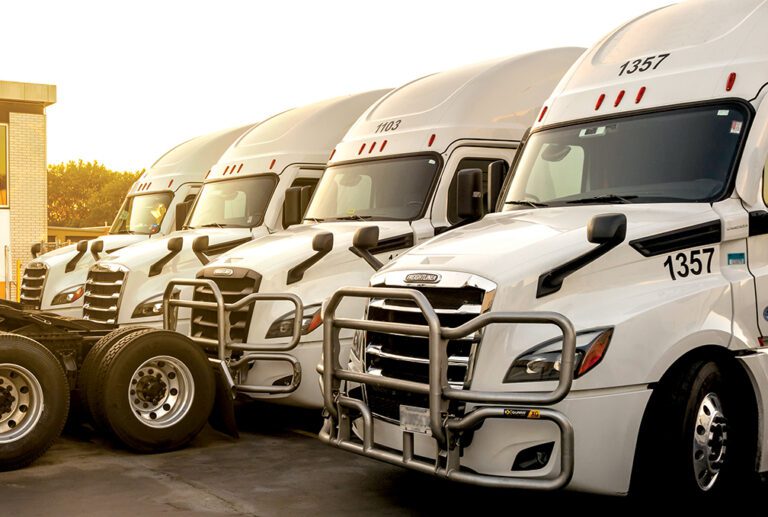August was another strong sales month for new Class 8 tractors on the U.S. market, according to data received from Wards Intelligence. Manufacturers reported sales of 23,342 trucks during the month, up 11% from July sales of 21,021.
Compared with sales in August 2022, however, U.S. Class 8 sales declined by 239 units (1%). It was the first month of 2023 that did not exceed sales in the same month of 2022. Rather than reflecting any 2023 slowdown, this is a sign of the strength of the market.
Freightliner reported sales of 8,158, an increase of 7.2% over July sales of 7,610 but a 16.6% decline from August 2022 sales of 9,783. Freightliner is responsible for 38.1% of U.S. Class 8 sales for the year to date, down from 38.4% at the same time last year.
The next largest share of the Class 8 market goes to International with 14.3%. The company reported sales of 3,587 in August, up 18% from July sales of 3,039 — and a whopping 30.5% higher than August 2022 sales of 2,749. For the year to date, International Class 8 sales are up 39.9%. International has gained an additional 2.5% of the market since the same point of 2022.
Kenworth sales of 3,689 represented an increase of 21.9% over July sales of 3,026 and an 11.5% increase over August 2022 sales of 3,310. The company’s share of the U.S. Class 8 market stands at 14.1%
Peterbilt reported 3,458 Class 8 trucks sold in August, up 4% from 3,325 sold in July and up 4.9% from 3,298 sold in August of last year. Peterbilt’s market share is 14.2% for the year to date.
Volvo’s reported sales of 2,130 in August topped July sales of 1,944 by 9.6% but were 5% behind August 2022 sales of 2,243. For the year to date, Volvo has sold 1.9% more Class 8 trucks than at the same point in 2022, the smallest increase of any manufacturer — and well below the 15.2% average growth for the industry. Volvo’s share of the U.S. Class 8 market stands at 9.8%, a decline of 1.3% from last year.
Mack Truck’s reported sales of 1,598 was a 17% improvement over the 1,366 sold in July and was a mere four trucks (0.3%) higher than August 2022 sales. The company holds 6.6% of the new Class 8 market, up a tenth of a point from the same point last year.
Western Star reported 722 trucks sold in August, up 6% from July’s 681 and up 19.5% from August 2022 sales of 604. Western Star owns about 2.8% of Class 8 trucks sales this year, about the same as at the same point last year.
For the first time in 2023, Tesla did not report sales of any Class 8 trucks.
Orders for new Class 8 trucks were estimated at 19,000, according to a release from ACT Research. That number represents the North America market rather than just the U.S. but represents the biggest order number since February of this year. The figure is also impacted by the time of year.
“As represented by seasonal factors, the industry remains at that time of year when expectations for order activity are low, as most of the current year’s orders have been booked and out-year build plans are only starting to open,” explained Kenny Vieth, ACT’s president and senior analyst.
August is typically the month when manufacturers change their orders to the next model year. The backlog of orders already placed will keep the assembly lines busy through the end of the year, and some customers are reluctant to order into 2024 until they know for sure what the economy and freight markets will do.
Price increases for 2024 may also play a part in keeping orders down. Most of the OEMs placed surcharges on the price of 2023 models in an attempt to recoup the rising costs of parts and materials. While buyers hoped the surcharges would be temporary, in most cases they have been rolled into next year’s base price. As the new Environmental Protection Agency (EPA) standards that will go into effect in 2027 get closer, 2024 prices may seem like a bargain.
Used truck sales figures weren’t published at the time of this writing, but inventories have been growing and average pricing has been steadily declining as fleets take delivery of the new trucks they have ordered. Unfortunately, credit costs are higher and lenders, some still reeling from the number of loan defaults, have generally been tightening loan requirements. Buyers may need larger down payments to secure financing, if they qualify at all.
On the horizon is a pre-buy of 2025 and 2026 model trucks in an effort by carriers to avoid the additional cost and unknown reliability of 2027 models. That pre-buy could free up more used equipment, driving average prices downward, but how many trucks will be sold is an unknown. In 2006, sales records were broken as carriers stocked up to avoid the higher fuel and maintenance costs predicted for 2007 models. Some experts think the 2026 pre-buy could break current records.
A Sept. 12 release from ACT Research was entitled “Half of all commercial vehicles will be zero emissions by 2040.” That number includes all classes of commercial vehicles, not just Class 8. For perspective, in August, 23,026 vehicles in Classes 4-7 were reported sold by manufacturers. That’s roughly equivalent to the 23,342 Class 8 trucks sold.
“We forecast a relatively low adoption rate from 2024 through 2026, reflecting the fact that BEV (battery-electric vehicle) sales of commercial vehicles are still in their early years,” said Ann Rundle, vice president of electrification and autonomy at ACT. Rundle noted that increasing prices for diesel trucks will push more buyers to BEVs, along with ever-tightening government regulations.
Smaller trucks running local routes and returning to the same location daily will be quicker to adapt BEVs with operations using larger trucks coming on board as battery capacity improves and charging infrastructure is added.
As with most products, government mandates may hurry the adoption process, but the biggest growth will occur when businesses project the new technology to be more cost effective than the old.
Cliff Abbott is an experienced commercial vehicle driver and owner-operator who still holds a CDL in his home state of Alabama. In nearly 40 years in trucking, he’s been an instructor and trainer and has managed safety and recruiting operations for several carriers. Having never lost his love of the road, Cliff has written a book and hundreds of songs and has been writing for The Trucker for more than a decade.














